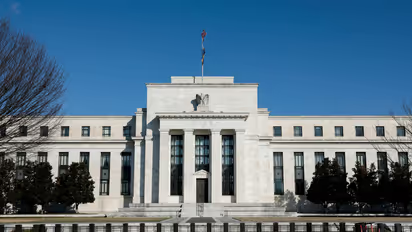US Federal Reserve cuts interest rates by 50 bps in a 1st since 2020: Decoding why it matters for India

Synopsis
The US Federal Reserve on Wednesday reduced interest rates by 50 basis points, marking the first cut in over four years.
The US Federal Reserve on Wednesday reduced interest rates by 50 basis points, marking the first cut in over four years. The Federal Open Market Committee (FOMC) stated, "In light of progress on inflation and the balance of risks, the Committee decided to lower the target range for the federal funds rate by 0.5 percentage points to 4.75% to 5%."
This decision indicates the start of a policy shift aimed at easing the restrictive measures previously put in place to manage inflation. As a result, the rates at which commercial banks lend to consumers and businesses will decrease, lowering the cost of borrowing for various financial products, including mortgages, auto loans, and credit cards. This cut is anticipated to make borrowing more affordable, thereby encouraging increased spending and investment.
The Federal Reserve's recent rate cut is expected to have significant global repercussions, especially for emerging markets like India.
An immediate outcome of this rate cut could be a rise in foreign investment in India. Typically, higher US interest rates lure investors to US Treasury securities for their attractive returns. However, with the recent rate cut, yields on these securities are expected to fall, prompting investors to look for better returns elsewhere, such as in Indian equities and debt markets. This shift could lead to a significant influx of foreign capital into India, increasing demand for Indian stocks and bonds and potentially driving up their prices.
The influx of foreign capital will likely impact the Indian Rupee (INR) as well. As foreign investors convert their currencies to INR for investments, the demand for the rupee will rise, potentially causing it to appreciate against the US dollar. A stronger rupee can have mixed implications; while it may reduce the cost of imports, particularly essential commodities like oil, it could also adversely affect Indian exporters by making their products more expensive for foreign buyers.
Globally, lower interest rates often lead to a rally in bond markets. In India, this could make existing bonds more attractive due to their relatively higher yields compared to new issues. As a result, borrowing costs for both the government and corporations might decrease, potentially encouraging more capital investments and stimulating economic growth.
Certain sectors in India could benefit directly from the Fed's rate cut. For example, the information technology (IT) sector may see increased demand as US companies expand their IT budgets due to lower borrowing costs. Other sectors, such as consumer goods and infrastructure, could also experience growth as financing becomes cheaper.
The Reserve Bank of India's (RBI) response to the Fed's actions will be crucial. While US rates have historically influenced Indian monetary policy, RBI Governor Shaktikanta Das has indicated that India may not necessarily follow suit with its own rate cuts. Das emphasized that maintaining financial stability remains a top priority for the central bank. "Financial stability is a prime consideration," Das noted, underscoring the importance of a robust and resilient financial system. His comments suggest that the RBI will carefully evaluate domestic economic conditions and risks before making any decisions on interest rates.
Check the Breaking News Today and Latest News from across India and around the world. Stay updated with the latest World News and global developments from politics to economy and current affairs. Get in-depth coverage of China News, Europe News, Pakistan News, and South Asia News, along with top headlines from the UK and US. Follow expert analysis, international trends, and breaking updates from around the globe. Download the Asianet News Official App from the Android Play Store and iPhone App Store for accurate and timely news updates anytime, anywhere.